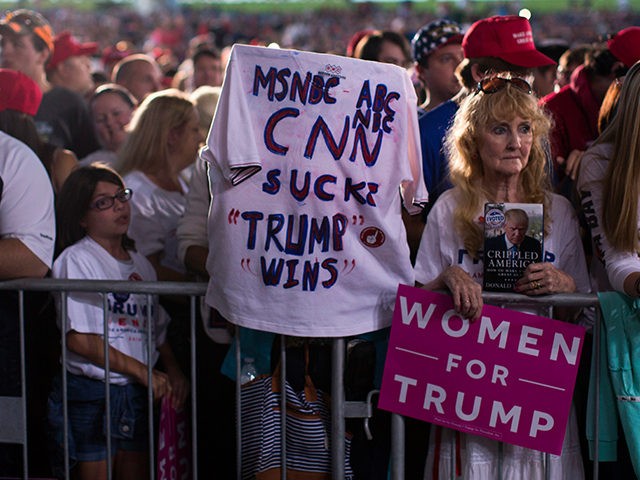Americans dislike the news media, though we depend on them for information. And cable news has been a target for ridicule for at least a decade, ever since Jon Stewart used The Daily Show to lampoon the genre. But CNN is particularly disliked, especially — though not uniquely — by supporters of President Donald Trump.
CNN’s unpopularity is reflected in its shockingly poor ratings, but also in the chants of “CNN sucks!” that erupt at Trump rallies.
What is it about the pioneering cable news network that is so hated?
CNN might argue that it is the victim of a vicious campaign, led by President Trump himself, to label the network “fake news.”
But Trump would not be the first president to single out a news outlet. Barack Obama did the same to Fox News, telling Rolling Stone in 2010 that the network was “destructive to [America’s] long-term growth.” His staff also called Fox “opinion journalism masquerading as news.” Few journalists, and even fewer Democrats, denounced Obama’s attacks as a threat to democracy.
Democracy survived — and so did Fox, which actually thrived under attack from Obama. CNN’s fortunes, by contrast, have moved in the opposite direction.
One reason is that CNN has competition that Fox does not, in the form of MSNBC, the openly left-wing network that has seen its ratings rise in the Trump era. In an increasingly divided political environment, viewers may have less interest in news produced by a network whose brand — theoretically, at least — is one of non-partisan objectivity and “facts first.”
The question is whether CNN is actually true to that brand. And many viewers feel that it is not. CNN is perceived as being guilty of false advertising — namely, claiming to be in the middle of the political spectrum while actually driving a hard left-wing agenda.
When the Black Lives Matter movement erupted, for example, CNN pushed the false idea that Michael Brown had raised his hands in surrender and told police, “Don’t shoot.” A CNN panel — including conservative Margaret Hoover — offered a protest of its own.
In the run-up to 2016, CNN — perhaps aware of the perception that it was, in fact, left-wing — added new conservative panelists, including pro-Trump pundits like Jeffrey Lord. It fired him on the flimsiest of pretexts after the election, leaving behind nominal Republicans who usually endorse their liberal opponents’ hatred of Trump.
After Trump won, CNN became hostile to Trump — perhaps, rumor had it, to deflect liberal criticism that it had “enabled” him by giving him too much airtime during the race.
CNN soon moved beyond covering the news into creating it. It was one of the first to report the unverified Russia “dossier” on Trump, which had served as the basis for the Obama administration’s surveillance of Trump associates during the campaign. In doing so, CNN allegedly worked with former Obama intelligence chief James Clapper, whom it later hired as a contributor.
Since then, CNN’s coverage has been guided by the idea that Trump ought to, or is about to, be removed from office. To that end, for example, it covered porn star Stormy Daniels as if her lawsuit against Trump were more important than nuclear talks with North Korea.
This week, CNN’s Brian Stelter, host of Reliable Sources, defended U.S. journalists in Helsinki who asked Trump and Russian President Vladimir Putin about the 2016 election while ignoring foreign policy. Stelter’s predecessor, Howard Kurtz (now at Fox News), used the show to critique the press. Today, it is merely a megaphone for CNN’s anti-Trump hysteria.
That hysteria has a damaging effect on American politics, and on America’s image abroad. In many countries, CNN is a major source of international news, and news about the United States. It presents an image of politics in the U.S. that is badly skewed against the Trump administration.
CNN could have chosen a different path. Faced with accusations of bias and “fake news,” it could have proven the president wrong by delivering more accurate news coverage and more balanced opinion.
Instead, it chose to become a player in the partisan fight, while still pretending it stood for objective truth. That ambivalent — and, ultimately, fraudulent — posture epitomizes the problem with the news media in general.
CNN confuses attacking Trump with defending journalism. That is why Americans change the channel.
Joel B. Pollak is Senior Editor-at-Large at Breitbart News. He is a winner of the 2018 Robert Novak Journalism Alumni Fellowship. He is also the co-author of How Trump Won: The Inside Story of a Revolution, which is available from Regnery. Follow him on Twitter at @joelpollak.
Correction: An earlier version of this article referred to John Brennan, not James Clapper, as the Obama intelligence official with whom CNN is alleged to have worked on the publication of the dossier.

COMMENTS
Please let us know if you're having issues with commenting.